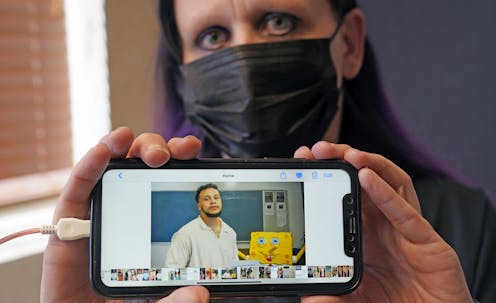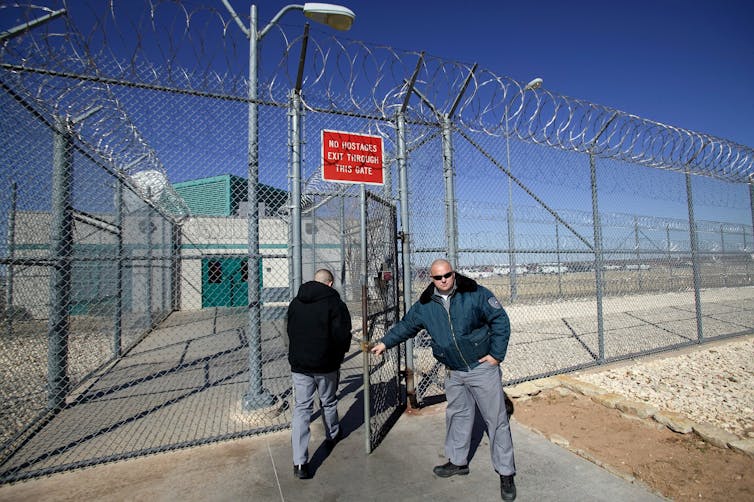No visits and barely any calls – pandemic makes separation even scarier for people with a family mem
For the 6.5 million Americans who have an incarcerated family member, COVID-19 has made an already stressful situation much worse by drastically limiting communication and raising fears of death.

Jails and prisons in the United States had a coronavirus infection rate three times greater than the general population, with an average of 1,400 new COVID-19 infections and seven deaths every day over the past year.
America’s correctional facilities are notoriously bad for spreading infectious diseases. Millions of people constantly cycle in and out of them every year and they have limited medical staff and supplies. People in prison also spend extended periods in crowded indoor spaces, with poor air circulation and ventilation.
For many people who are incarcerated, either awaiting trial in jail or imprisoned after conviction, being locked in a pandemic hot spot has been terrifying. And for the 6.5 million Americans who have a family member incarcerated, COVID-19 has made an already highly stressful situation much worse, according to our criminology research.
Throughout summer 2020, we surveyed more than 500 people who have a family member incarcerated in Texas – a state with the country’s worst COVID-19 outbreaks in correctional facilities. Nearly 200 provided personal statements about having a loved one incarcerated during the pandemic.
People conveyed deep concern about the conditions of their family member’s confinement and struggled to cope with new pandemic restrictions on visits and other communication. Many feared their family member would die of COVID-19, alone, in prison – as 2,564 incarcerated people in the U.S. have already done this year.
‘We don’t incarcerate, we torture’
With more than 34,000 positive COVID-19 cases in the Texas Department of Criminal Justice so far, infection rates in Texas prisons are 40% higher than the national prison population average. Texas has recorded some of the highest number of COVID-19 deaths of incarcerated people nationwide: 187 deaths as of April 16, 2021.

Our study participants belonged to the Texas Inmate Family Association, a nonprofit organization that provides support to people with family incarcerated in the state. The survey was conducted anonymously, so we include only limited personal details about the respondents and their family members here and have not verified their assertions.
Our survey showed that people with a family member incarcerated during the pandemic experienced extreme distress. Seventy-nine percent were very concerned that their loved one would contract COVID-19 in prison. The vast majority were women with a child or spouse incarcerated.
“My son has been locked in a cell with temperatures over 100 degrees for up to 23-plus hours a day for weeks on end now due to COVID,” one 74-year-old woman who lives near San Marcos told us. “I fear he will either perish from the conditions or somehow take his own life.”
Many Texas prisons lack masks, soap and hand sanitizer. Yet family are not allowed to bring sanitizer into prisons: It is considered contraband in federal prisons and state prisons in over a dozen states.
One father compared the conditions his child was experiencing in prison “to a concentration camp.”
Even before the pandemic, a mother told us, having a child in prison was stressful because of “the disregard the Texas Department of Criminal Justice system, in general, has for the well-being and rehabilitation of the inmates. Living conditions are deplorable, the food is not nutritious, dental and medical care is too difficult to access, [and] there are too many extended lockdowns.”
“We don’t incarcerate, we torture,” she said.
The Texas Department of Criminal Justice has been sued in the past over prison conditions and recently over its coronavirus policies and practices.
‘We have lost a part of us’
Incarceration always physically separates family members; that’s part of the punishment. And during COVID-19, it is a particularly harsh punishment.

A woman in San Antonio told us, “The hardest part of this pandemic is not having my husband…by my side.”
Her husband has been incarcerated for 11 years.
In Texas prisons, all types of contact with the outside world – including video and phone calls – were severely limited and visitation barred completely on March 13, 2020, when Gov. Greg Abbott declared a state of disaster. That included juvenile facilities.
“Phones have been disabled during COVID and [the] few calls are only 5 minutes,” said a Houston woman whose son is incarcerated at the Huntsville Penitentiary in Texas. “It is all so hard on inmates, but so, so hard for families.”
Texas reopened jails and prisons to visits on March 15, 2021.
But the separation will have already taken a high toll on once-intimate relationships, our research shows.
“We have lost a part of us being separated for so long. We are not the same people,” said one 49-year-old woman last summer, whose incarcerated fiancé had been unable to communicate with her.
“My fiancé has lost hope and is struggling, and it breaks my heart.”
‘Worried sick’
As criminologists who study the health consequences of incarceration, we know that worry over the well-being of an incarcerated loved one is a common and severe stressor. Studies show that having a family member incarcerated is detrimental to the psychological and physical health of parents, spouses and children.
The stress of knowing an incarcerated family member could become ill with a deadly virus adds to existing fear they will be mistreated or assaulted in prison.
Several family members of the people we interviewed did indeed contract COVID-19. One woman, whose husband had recently tested positive, said she had difficulty getting in touch with nurses to update her on his condition.
“I am worried sick,” she said.
[Over 100,000 readers rely on The Conversation’s newsletter to understand the world. Sign up today.]
Some people said they were kept in the dark about their family member’s illness.
“I did not even know he had contracted COVID-19 until several weeks after,” said one woman of her husband.
“He was on lockdown, and couldn’t call home.”
Alexander Testa receives funding from Aging Research in Criminal Justice Health Network (ARCH), National Institutes of Health, and Bureau of Justice Assistance
Chantal Fahmy received funding from the Aging Research in Criminal Justice Health (ARCH) Network, National Institutes of Health and from the Bureau of Justice Statistics, National Institute of Justice.
Read These Next
Do special election results spell doom for Republicans in 2026?
Special election results have anticipated recent midterm outcomes. With Democrats now overperforming,…
The intensity and perfectionism that drive Olympic athletes also put them at high risk for eating di
Athletes in sports where weight and body image come into play, such as figure skating and wrestling,…
OpenAI has deleted the word ‘safely’ from its mission – and its new structure is a test for whether
OpenAI’s restructuring may serve as a test case for how society oversees the work of organizations…





